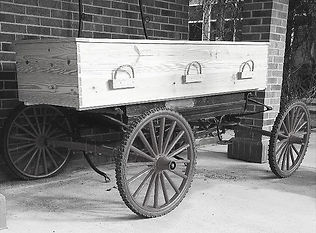


It is said that we come from the earth and we return to the earth.
We build vessels for the return journey.

Casket Design & Construction
We design for the inevitable, working with nature to return the body and the casket to the earth.
biodegradable materials only
Mindful of a complete return to the earth, we build our certified caskets without the use of any metal fasteners.

We respect the unique needs of each family and will work collaboratively to accommodate your wishes.

We want families to feel empowered in planning for the burial of a loved one. Shown above is a two-piece lid built as a special order.
We make every effort to honor special requests that are important to your family in terms of ritual, ceremony and remembrance. One family painted a tree trunk to symbolize their family. At the service each family member added a fingerprint to give it leaves.

“We design and build each casket as though it was for our family.”


Materials


Pinus taeda
_edited_edi.jpg)

Southern Yellow Pine (SYP)
Southern Yellow Pine is a commercial designation for a group of pine species in the southeastern U.S.:
Pinus taeda - loblolly pine
Pinus elliotii - slash pine
Pinus echinata - shortleaf pine
Pinus palustris - longleaf pine
In most regions of the southeast, Pinus taeda is the predominant species used for lumber.
Our caskets are constructed out of Southern Yellow Pine or White pine sourced from responsibly managed forests in the North America.
We go to the mill or lumber yards ourselves and pick through the stacks, selecting boards with the most attractive grain pattern.
By using wood from local forests and mills, we
-
reduce transportation costs and fossil fuel consumption
-
help keep local jobs
-
promote sustainable land management practices.


Vernicia fordii
We apply tung oil or hemp oil to the finished casket to bring out the beauty of the grain.
These natural oils leave a matte finish and a touch of honey-colored warmth.
Although we favor using oil finishes in the shop because we prefer the look and feel, we can also leave wood untreated by request, as in our Mayo
Creek version.

Tung Oil
Tung oil is extracted from the seeds of the southern Asian Tung Tree, Vernicia fordii.
Applying tung oil to the surface of the wood increases the contrast of the grain and creates a sense of depth.

Titebond Original Wood Glue
Reinforcing joints with glue is critical part of stabilizing the structure.
The polyvinyl resin created when the glue dries is non-toxic, and in the small quantities used, has minimal environmental impact for burial or cremation.


Our caskets are certified "3-Leaf" by the Green Burial Council, their highest rating for environmental responsibility.
-
Finishes and adhesives do not release toxic by-products during manufacture and do not contain plastics, acrylics or similar synthetic polymeric materials.
-
The shell is made from material harvested in an environmentally sustainable manner.
-
Greenhouse emissions from manufacture and transportation have been offset through a recognized program.
Casket Considerations
FUNERAL HOME
Yes, you can take your own casket to a funeral home.
You have the right by law to provide your own casket or coffin.
You are not obligated to purchase a coffin from a funeral home, even if they are providing other services for you.
CEMETERY
Cemeteries that accommodate green burials are limited, but fortunately the number is growing. Start with the Green Burial Council's list of providers or talk to a funeral guide to help you identify options in your area.
Some traditional (non-green) cemeteries will accept wooden caskets, but they may require an outer vault to prevent the grave site from settling as the casket decomposes.
Certain cemeteries will allow natural burial with no enclosure, using only a shroud to cover the body. This is a matter of cemetery policy, not state law.
CREMATION
Most states require that a body be enclosed in a "rigid container" for cremation
Our caskets satisfy the container requirement in an ecologically-responsible manner.
With no metals or plastics, our caskets burn clean. If you cremate, consider having us build an urn from the same wood.
Our commitment to our clients and to the earth:
TALK the TALK:
We are committed to:
1) minimizing the environmental impact of our products and practices
2) honoring our client's need for meaningful practices around death
WALK the WALK:
To achieve our goal, we will:
1) adopt current best practices for "green burial" and "green business"
2) listen respectfully to our clients in order to best serve their needs
THE DETAILS:
1a) Our products meet the highest standards for green burial as established by the Green Burial Council, an independent non-profit dedicated to sustainability in the field.
1b) We have modeled our business practices on the standards set of Green America, a not-for-profit with a stated mission to "harness economic power—the strength of consumers, investors, businesses, and the marketplace—to create a socially just and environmentally sustainable society."
-
We evaluate our practices for environmental and social consequences. Although cost and profit must be a concern, it is not our sole concern. Our Green Business Certification through Green America embraces an objective green business model and verifies our commitment.
-
We select and source our materials based on sustainability. (The Green Burial Council also checks our work on this one).
-
We practice transparency by openly stating the materials we use, through our third-party certifications, and directly addressing questions and concerns from our clients.
2) We keep up with trends in home funerals by regularly participating in events such as Death Cafes and through our membership in organizations like the National Home Funeral Alliance. We are continually learning from the leading voices in the field about how to best serve families during the end of life process. We will also continue to listen attentively to the most important voice - yours.





